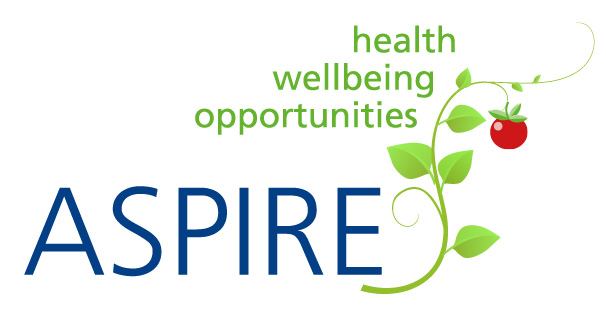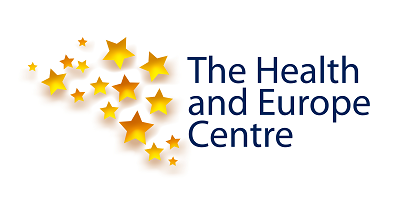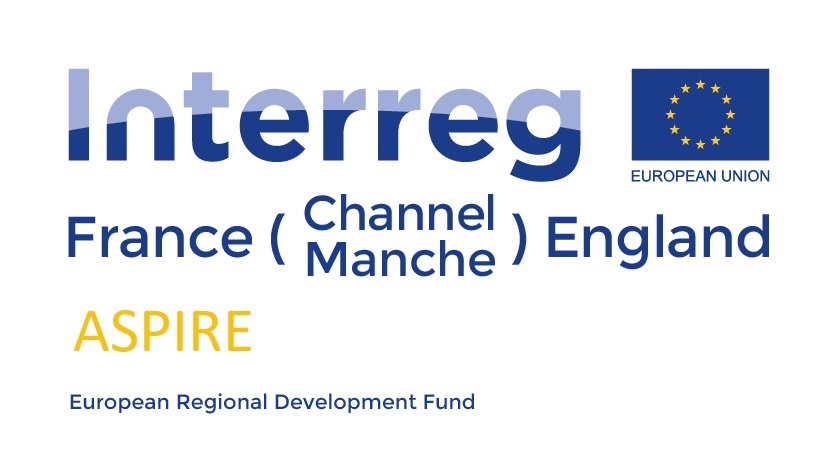



Obesity across the FCE (France Channel England) area is a significant concern; high levels of obesity coincide with high rates of unemployment across the zone. A Gallup poll shows that the longer a person is unemployed, the higher the rates of obesity, with rates reaching up to 32.7% after a year or more of unemployment.
ASPIRE will give obese/overweight and/or unemployed people the tools they need to make healthier lifestyle choices and improve their employability. Current health and employment services rarely work together to tackle the issues as one problem, despite the evidence that they are linked. A new FCE model, co-created using partner expertise in both fields, will holistically combine the necessary support to increase employability with access to local healthy food produce and consequent weight loss. The model will be implemented via seven implementation sites and innovative technology in order to enable participants to improve their relationship with food and provide them with the skills and support they need to gain access to the labour market. Current services also have difficulties in reaching the target audience due to the remoteness of much of the non-urban target population. Public Health England data shows a correlation between the fact that most services are delivered in town centre locations (lower obesity rates) and rural populations are disadvantaged (higher obesity rates) as access to services is harder.
ASPIRE (Adding to Social capital and individual Potential In disadvantaged REgions) has received more than €7 million from the European Regional Development Fund.
ASPIRE is part of the Interreg VA Channel programme and will run from September 2019 to June 2023. The project has a total budget of over €10million and involves partners from the UK and France (see partner details below).
What is the ASPIRE Interreg project?
The acronym ASPIRE stands for Adding to Social capital and individual Potential In disavantaged REgions. It is a European project between the territories of the North of France and the South of England financed by the ERDF.
Through social innovation, ASPIRE targets overweight, obese and/or unemployed people (we will call them a cohort).
ASPIRE enables people in danger of economic exclusion to (re)participate actively in the economy, by giving the beneficiaries skills, know-how and interpersonal skills on various topics:
The ASPIRE project aims to supports and increase motivation for people who want to implement a behavioural change “step by step”. This will help towards a return to employment through a general improvement of your wellbeing, self-esteem and self-confidence, the pillars of the ASPIRE model.
This inclusive project improves people who face social isolation. The objective of the ASPIRE programme is to offer small group workshops to the ASPIRE cohort as well as individual workshops in order to (re)empower the cohort to move towards employment through the development of their soft skills.
In order to deepen the topics discussed in the group, a digital coaching platform has been created, which allows the sharing of tips and tricks for a sustainable acquisition of health-promoting behavioural changes.
It is available at the following address: aspire.vivonsenforme.org
The ASPIRE programme also addresses the corporate sphere. Indeed, the ASPIRE project also offers a “Practical Guide“: Facilitating the professional inclusion of people with obesity” for employers. Its purpose is to raise awareness of the prejudices and discrimination in hiring that overweight or obese people often face in the workplace.
This practical guide provides information and strategies for communities and organisation to better support job seekers, and is also a valuable resource for companies to hire and retain overweight and obese people. It can be downloaded at the following address: https://vivonsenforme.org/interreg-aspire/
The ASPIRE programme therefore has a holistic approach that aims to provide a comprehensive and simultaneous response to two highly correlated issues: high unemployment and high rates of overweight and obesity.
How to implement this programme in my region?
The aim of this model is to make the Interreg ASPIRE project sustainable and to offer it to a large number of organisations and communities that wish to address issues related to employment, obesity and general wellbeing. The model allows you to understand the key stages in setting up a support programme that promotes the ASPIRE values.
This document is composed of 10 steps :
Each of the steps is explained in detail, with advice and support documents. This allows organisations or local communities wishing to implement the “ASPIRE” project to follow an easy step by step programme. The programme is totally adaptable and flexible according to your local needs.
Understanding the local context
Have localised data to make the model most relevant to the needs of the target population.
Responds to local issues.
Difficulties in collecting localized data.
Selection: location and engagement with partners
The location of the place where the actions are deployed is decisive for the success of the project.
The choice of the location of the hub is multi-criteria, it is a combination of statistics and local experience.
Use an existing structure in the city that is well known to the cohort.
Difficulty in achieving complementarity, multidisciplinarity, a factor for the development of a sustainable partnership.
Responding to the needs of the target audience
Understand the target audience’s expectations through expert committees and focus groups.
A “tailor-made” programme responding to the expectations of the cohort and the professionals.
Sustainable mobilisation of stakeholders.
Recruitment of the ASPIRE participants
Targeting overweight, obese and/or unemployed people, socially isolated people, people who want to be social.
Provide support to those who want it.
Sustainable participation in the workshops offered.
Building the actions
To meet the expectations of the target group so that they feel involved and increase their commitment to the project.
Joint actions on the themes of nutrition, physical activity and mental well-being.
A “tailor-made” programme responding to the expectations of the cohort and the professionals
The cost of actions can be high.
Implementing the actions
Propose themes according to one’s field of expertise, get closer to the local fabric to complete the panel of workshops.
A programme that evolves according to demand.
The availability of the cohort.
Evaluating actions
Measuring the impact of ASPIRE workshops on behaviour change.
To observe the effectiveness of the actions implemented.
To observe the effectiveness of the actions implemented.
Continuous improvement of the programme
Taking a step back and adapting the actions that worked least well during the workshops.
Actions adapted to the real needs of the cohort.
Some parameters cannot be changed.
Budgeting the project
Bien budgétiser les activités proposées en fonction de la taille du groupe et des ressources mises à disposition pour le projet.
Have the average cost according to the size of the group
Lack of funding for workshops.
To make the project sustainable
Allow for continuity of the programme by offering the project to a new cohort.
A sustainable solution that benefits a maximum number of people.
Continuous search for subsidies and funding.